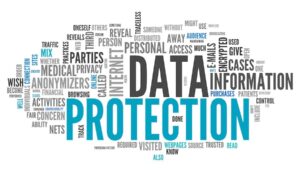- Data protection and privacy matters are becoming a challenge at all levels as we lean toward digitalisation
Our newfound world of connected devices and people is exciting; so much so that most of us are more than willing to easily share any information about ourselves, work and family online.
There lure of having a great experience online is to be connected as much as possible and to share a lot of content. However, while you’re at it your digital footprints are left around while you cruise online.

Recent happenings however caution against sharing too much information about ourselves or loved ones online. This has led to spotlighting the concept of privacy, which is very big in most parts of the world. Service or platform providers are therefore required to have privacy policies for their operation. These policies have to be clearly displayed on their websites for visitors to read.
As a consumer, you have the right to know how the custodian of your data intends to protect and use that data. So it is in place to inquire from your Telecom service provider and your bank how they are going to protect the personal information you shared with them.
It’s worth knowing that when data and privacy issues are mentioned we tend to look at cybercriminals as those who are interested in knowing more about us so as to be able to hurt us.
Aside from the cybercriminals, there are others who are equally after your data for a specific set of reasons. Let’s look at these other interested parties.
ISPs
Internet service providers, as their name depicts, are the ones who make it possible for you to get online in the first place. From the very moment you get online till you exit, your Internet provider can track all sites you visit. They act as the gateway to the online world. In fact, ISPs have a greater chance of tracking you online than your usual social media platforms.
Aside from knowing the sites you visit, they are also able to gather the following data about you: Your ISP is able to tell exactly the duration of your browsing time on a specific website. While on the website they are able to tell in detail specific activities on the site. Do you also know that your Internet provider can tell from which device you are browsing and from where?
When ISPs collect your data, what do they use it for? Among the benefits of your data to Internet providers is the opportunity to trade it with people who want to target you for advertisement.
Government
In recent times we have seen in our country various national efforts aimed at gathering information about the citizens. From the Ghana card registration, population census and the ongoing SIM registration exercise, detailed information is being gathered about you.
It is a good thing for government to know just enough about you. When a government has accurate information about its citizens, it can help in planning for the effective distribution of the county’s resources to benefit them.
The data ISPs have about you can be made available to law enforcement agencies like the police or the courts when required for specific instances.
With government services moving online, a lot of data is gathered any time you interact with its agencies online, like visiting their website, doing transactions or via email correspondence.
Yes, government can request your information – but that has to be done by laid-down legal procedures.
Search engine
Search engines do track your online activities when you make searches via them. By tracking your searches they are able to tell your interests, which they can sell to advertisers.
Aside from your interests, search engines are also able to collect other data which include your location and your gender. The data collected are valuable to advertisers who want to target you with their products and services. Aren’t you surprised sometimes seeing online ads that match exactly your product or service interest lately?
Advertisers
One of the ways advertisers get their data is via cookies on pages of websites you visit. This information can expose among other things your browsing patterns and interests.
Advertisers also get information about you when you create accounts on various social media platforms or fill in online forms.
Other Service providers
Many service providers these days want to make informed decisions regarding your unique situation. They can effectively do this if they have some amount of information about you. With the help of credit agency services, banks are able to determine the creditworthiness of a client. Data is collected from various sources to be able to do that.
It is also important to note that recruitment agency services are now heavily dependent on information gathered about a candidate beyond their résumés. Various other services also require data to be effective in our digital world today.
In fact, we all need some privacy online just as it is in normal life. I should feel safe making some searches into a health condition I don’t want anybody knowing I have – right? Or look up some websites for my personal entertainment once in a while.
What about my seeking different opportunities if I want to switch camps or even change jobs, should that history be stored and intentionally shared or unintentionally exposed?
The first responsibility of your data protection and privacy lies on you. Know what to share online.










